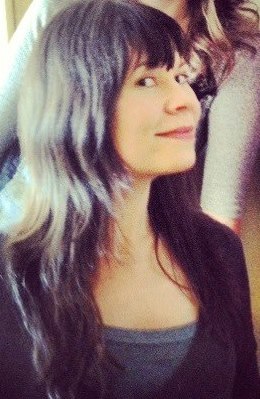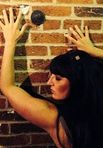Carpe Noctem Chapbook Interview With Kate Angus
 Negative Capability Press, 2016 HINGS WE’RE DYING TO KNOW…
Negative Capability Press, 2016 HINGS WE’RE DYING TO KNOW…Let’s start with the book’s title and your cover image. How did you choose each? And, if I asked you to describe or sum up your book, what three words immediately come to mind?
The cover image is a section taken from Galaxy I, a painting by my late cousin Paul Heald, who was an abstract artist on the West Coast. Paul’s paintings are an inextricable part of both my emotional life and my aesthetics—the large painting my book cover comes from hangs in the living room of my childhood home in Michigan and a small study of another painting in the Galaxy series is above my desk in New York. I don’t think I ever made a conscious decision to use Paul’s work—it just always felt like a natural part of how my poems would exist in the world. But it has been so bittersweet for the book to come out after he died. I wish he could have seen this, that I could have told him how much it means to me.
A few years ago, when it was a different beast, this collection had a different title. I’d sent it out to a few places and it was a finalist with some great presses, but when it didn’t find a home, I took a long hiatus from submissions to rework it. I revised and reordered, and watched people I know publish their first, second, third, etc. books while I channeled Sisyphus, laboring but unable to move forward. I thought, “Oh, I’m late to the (publication) party. This book is late to the party.” So the title is a description of how I began to feel about the book, but it’s also a fine summing up of my life in so many ways. I’ve always been a bit of a late bloomer—late to my career path, late to graduate school, late to certain epiphanies and benchmarks in adulthood in general. I’ve stopped stressing out about all that. Now I just think, “OK, I’m a little late, but I saw interesting things along the way—hopefully there’s a bit of champagne and cake left now that I’ve finally arrived.”
Three words to sum up or describe my book? I’m drawing a blank. Maybe “about goddamn time.”
What were you trying to achieve with your book/book? Tell us about the world you were trying to create, and who lives in it.
I’m not sure what I was trying to achieve really--just to make the internal external, to write poems that felt true to how I experience the world.
Can you describe your writing practice or process for this collection? Do you have a favorite revision strategy?
Generally, I start with a few scraps already extant—a handful of words or an image or idea that’s somehow caught in the net of my brain—and then build the poem around wherever those lines take me. When revising, I primarily rely on changing line breaks and stanza breaks to see if those physical changes will help me find little doors inside other parts of the poem to enter and rework.
How did you order the poems in the collection? Do you have a specific method for arranging your poems or is it sort of haphazard, like you lay the pages out on the floor and see what order you pick them back up in?
I printed them out and arranged them on the floor. Then I tried to connect poems together to create an internal arc—not a narrative precisely, but the echo of a narrative where poems that shared a similar subject matter or craft approach naturally fell together or led from one to the next.
What do you love to find in a poem you read, or love to craft into a poem you’re writing?
I’ve always had an abiding fondness for nouns functioning as verbs and also for an affection direct address—perhaps to a distant other, but just as often to an inanimate object or idea.
Can you share an excerpt from your book? And tell us why you chose this poem for us to read – did it galvanize the writing of the rest of the collection? Is it your book’s heart? Is it the first or last poem you wrote for the book?
Of course. This poem is one of the last ones I wrote for the book and is, I think, perhaps the manuscript’s heart. In a way, it’s an ars poetica, an articulation of my approach to poetry—I do have “an archive of a mind” and the things I file away are often the genesis of my poems.
WILD RABBITS HAVE SHARP EYES
Which is another way of saying, everything you want to hide
blares like a motel’s Vacant sign. How long it took
for you to tumble into sleeping on the couch, the bed stripped
except for piles of laundry you could not bring yourself
to put away. Do you remember when you didn’t
live inside this city’s constant siren, when you were
the teenager in the woods, wearing dark like a blanket, the night
studded with stars as many as your friends. It’s just the past now:
the teenagers you later taught are all adults now.
They have children, lovers. You have a certain archive of a mind
that files away the beautiful impractical. For example: The Amish
cultivate saffron. For example, Octopi have three hearts and die
of starvation--the mothers stop eating to guard
their unhatched eggs. So you know things.
Knowledge doesn’t fix the faucet whose drip stains
the white sink chlorine blue. Information is only your own hands
stroking your hips as you turn each night. What you would give
to be a wheat field during a storm. Stalks bending, seeded
by violent rain, and the sky a clotted
purple arch above you, lightening strikes that jolt you so you remember
no matter how dead you feel you are not dead.
If you had to convince someone walking by you in the park to read your book right then and there, what would you say?
I think I’d do a far better job of charming a stranger into reading someone else’s book rather than my own. I die a little every time I have to post a status update on Facebook about a reading I’m giving or email people to ask for help with promotion. I can’t imagine—even as a thought exercise--grabbing a passerby by the lapels to say “Hey, you should pay attention to my work!” (even though, of course, I secretly believe everyone should).
For you, what is it to be a poet? What scares you most about being a writer? Gives you the most pleasure?
Poetry is a way for me to make sense of myself and of the world around me; being a poet is just my setting for how to be a person. Some people seek understanding through science or cooking or praying or therapy or running marathons. For me, line breaks and associative images help life click into focus.
There’s little that scares me about being a writer, but I do sometimes worry about being misinterpreted. So much of what happens within the poems could be interpreted in so manyways that are different than What Actually Happened and in various places I’ve also changed history (personal, familial) for aesthetic reasons. Occasionally I’m afraid someone will attach a narrative to the work that isn’t really true in the outside world, that they’ll think they recognize themselves inside my work and feel upset or hurt by how they think I’ve seen them or whatever way they think I feel, and yet what they’re seeing isn’t really there. I suppose I sometimes worry that people might think Poetry Kate is Real Kate or that any of this is journalism.
The best thing is feeling like I’ve accurately communicated. It’s a great pleasure to feel known and understood and to feel that--if I’ve articulated something that resonates as true inside someone else too—I also somehow know or understand my readers. There’s a kinship in that, in the relationship between reader and writer, and it makes the world feel less lonely.
Are there other types of writing (dictionaries, romance novels, comics, science textbooks, etc.) that help you to write poetry?
I frequently plunder articles about science or history or folklore for information that wends its way into my poems. The website Atlas Obscura has also been quite useful. And dictionaries are great.
What are you working on now?
I’m about half-way through a collection of lyric essays and I hope to have a completed first draft of the collection done by late fall.
What book are you reading that we should also be reading?
Oscar Martinez’s book The Beast, which is about following the migrant trail with Central American immigrants through Mexico to the American border, is pretty damn compelling—the stories of how much the migrants endure are heartbreaking and the writing itself is lyric and wrenching. As for poetry: Elizabeth Bradfield Once Removed and Ross Gay’s Catalog of Unabashed Gratitude are both in the bag I carry around every day and I’m flipping back and forth between both of them, equally enthralled.
Without stopping to think, write a list of five poets whose work you would tattoo on your body, or at least write in permanent marker on your clothing, to take with you at all times.
I’m too fickle (and pain-averse) for tattoos, but five poets whose work I’ve consistently loved for many years now are Richard Siken, Rainer Maria Rilke, Mary Ruefle, Matthew Zapruder, and Kevin Prufer.
What’s a question you wish I asked? (And how would you answer it?)
What’s your best baking secret?
I have two.For pie crusts, sift the flour twice—once before you measure it and then again after the first measuring.Both chocolate cookies and gingersnaps are vastly improved by the addition of a little bit of freshly ground cardamom.
***
Purchase So Late to the Party.
 Kate Angus is a founding editor of Augury Books. Her poetry and nonfiction have appeared in The Atlantic, Tin House, Best New Poets 2010, Best New Poets 2014, Subtropics, Gulf Coast, The Awl, The Rumpus, and Verse Daily. She has received the “Orlando” prize from the A Room of Her Own Foundation, as well as awards from Southeastern Review and American Literary Review. She is the Creative Writing Advisory Board Member for the Mayapple Center for Arts and Humanities and curates the “Pen and Brush Presents…” reading series for Pen and Brush.
Kate Angus is a founding editor of Augury Books. Her poetry and nonfiction have appeared in The Atlantic, Tin House, Best New Poets 2010, Best New Poets 2014, Subtropics, Gulf Coast, The Awl, The Rumpus, and Verse Daily. She has received the “Orlando” prize from the A Room of Her Own Foundation, as well as awards from Southeastern Review and American Literary Review. She is the Creative Writing Advisory Board Member for the Mayapple Center for Arts and Humanities and curates the “Pen and Brush Presents…” reading series for Pen and Brush.https://www.facebook.com/kate.angus.5
https://twitter.com/collokate
Published on June 27, 2016 07:43
No comments have been added yet.



